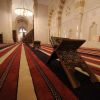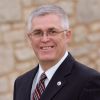Ontario’s child poverty targets unlikely to be met
TORONTO - It’s highly unlikely Ontario will meet its own poverty-reduction targets in 2013, food bank use has hit record levels and Ontario’s bishops are worried that decent housing has become a distant dream for too many people.
Muslim prayer room welcomed at Catholic school
Concerns that the establishment of a prayer room, requested by Muslim students, at a London, Ont., Catholic high school will water down the school’s Catholic faith are just plain wrong, says the school board’s education director.
“First of all it’s a prayer room, it’s not named after a particular faith,” said Wilma de Rond, director of education for the London District Catholic School Board (LDCSB). “When a request comes from another faith there is no request for us to provide any sort of accommodation for them that in some way impacts our faith.”
Although de Rond dismisses the concern, it has been circulating in the media since news about the second floor prayer room at Mother Teresa Catholic Secondary School broke earlier this month.
Earlier this year about 25 students at the southwestern Ontario school, with a student body of about 1,400, submitted a request to the principal for a room for Islamic prayer during lunch period on Fridays. This is the first religious accommodation request of its kind for the board, said de Rond.
The Ministry of Education’s Developing and Implementing Equity and Inclusive Education Policies in Ontario Schools requires all publicly funded schools in the province to provide religious accommodations when requested by students or their parents, provided that doing so does not cause excessive grievance to the school. As long as it does not place burdensome costs on the school, interrupt instructional time or directly conflict with existing policies/practices, the school is obliged to do so, as is the case in London.
“We are trying to work in a way that is respectful for our own faith, our Catholic faith, but also respectful of the fact that these young people have made a request that they want to be able to follow their faith,” said de Rond.
The goal, according to de Rond, is to outfit the room in a way that will satisfy the requirements for the Muslim students while maintaining an atmosphere where other students can use the room. Although no other groups have requested use of the room, it will be available outside the time allocated to the Muslim group.
De Rond sees this as nothing more than a learning experience. She did admit, though, that not everyone views this matter through that lens.
“Unfortunately there have been some concerns expressed in terms of racial comments which again is most unfortunate and is not in keeping with who we are as Catholic in terms of beliefs of our call to love one another,” she said. “There has also been expressions of very positive affirmation of this decision as well.”
The prayer room at Mother Teresa was expected to be completed by the end of September, although de Rond stressed there were still details to be worked out.
“It’s interesting for us to learn about a particular faith so it’s been a good thing for us to be able to have these conversations with the students and their parents and so we are proceeding forward in terms of our understanding of what will occur, how they pray, what they pray for (and) what the words of the prayers will be,” she said. “It’s increasing our own understanding, which is a good thing.”
Other Catholic boards are sure to receive similar requests, and are also seeing this as an opportunity.
“It’s not an imposition on us at all,” said Michael Way Skinner, co-ordinater of religion, family life and equity at the York Catholic District School Board. “It is an expression of who we are as Catholics. When we as a Catholic community accept that call to be welcoming to people of other faiths we are actually putting into practice what we are trying to teach the kids in the classroom and it’s by what we do, it’s by our fruits that they’ll judge us, not by what we say to them and what we try to teach to them off chalkboards or smartboards.”
Although he supports the idea, Way Skinner did admit his board might not be able to fulfill similar requests. It’s not that the board is unwilling, rather, most York Region schools are already pushing capacity and allocating an entire room for a weekly prayer service would cause excessive grievance.
“It might be a space like in the library or somewhere like that that is a quiet space for the students to gather to pray if they wanted to,” said Way Skinner.
French board numbers on the rise
While many of their Anglophone counterparts struggle with declining enrollment, the French Catholic District School Board of south-central Ontario opened three new schools this year to accommodate an increasing student population.
“The school board has an increase of students every single year and this year is not different,” said Réjean Sirois, director of education for the French Catholic school board which services south-central Ontario. “We’ll be over 14,500 students this year. It is an increase of four per cent.”
Since 2006 the student population has increased by about 2,500, placing a heightened demand on the board’s infrastructure.
On Sept. 4 the doors opened to the French board’s new elementary schools, École du Sacré-Coeur in Toronto and École Eléméntaire Catholique Notre-Dame-de-la-Huronie in Collingwood, Ont. Meanwhile in downtown Toronto students of École Secondaire Catholique Saint-Frère-André, who were formerly educated at West Toronto Collegiate Institute, explored their new home-away-from-home.
Formed in 1998 the board is responsible for a geographic area stretching from the Niagara Peninsula to Georgian Bay. Currently the board, one of eight French first-language Catholic boards in the province, operates 51 schools across the more than 40,000 square kilometres it services.
“There is a demand for a French first-language Catholic education and it has been like that for the past eight or nine years,” said Sirois. “There are several factors for the increase in our student population but mainly (it’s because) we’re putting schools where we didn’t have schools before. In certain regions where we didn’t have schools we’re now offering the service.”
This year’s additions do not represent the end of expansion for the board either. There are three more facilities in the works.
“As we speak we are building two new schools and pretty soon we’ll start building another school for Oakville,” said Sirois.
While Sirois admits there are several factors which have led to this continuous growth, there is one component which stands out — parental awareness.
“People are more aware now that there is a French Catholic school board where the instruction is done in a French first language,” he said. “With all the publicity and the effort from our communication department we have been able to reach more parents.”
Although the curriculum follows the same provincial standards as the English boards, all of the material, social interaction and extra-curricular activities are French-spoken only, said Sirois, detailing the difference between his board and the public system’s French immersion programs.
“We recognize the excellent work of our parents who support their children in French education,” said Sirois. “We’re lucky to have devoted staff dedicated to the difference of French Catholic education and it’s a good place to be, let me tell you, it’s a good place to be right now.”
A Dutchman’s love of organs is transplanted to Canada
Klaas Bos, the founder and owner of the Classical Organ Centre in Norwich, Ont., first fell in love with the instrument in his native Holland.
“When I was back in Holland, I immigrated (to Canada) in 1989, I got interested in organs. A lot of times, like on a Saturday afternoon, we’d go to an organ dealer and play a couple songs,” Bos told The Catholic Register.
While there, he got to know an organ dealer who, being wheelchair bound, would ask Klaas to assist him with deliveries and in fixing small parts.
“I got acquainted with the organs, like the ‘guts’ side of it,” said Bos.
After moving to Canada, Bos wanted to get back in the organ business, and decided to start up a market for European-style organs.
“I bought myself a ticket, went back to Holland and met with seven of the dealers that I knew personally and I knew wouldn’t ‘pull the skin over my nose,’ ” laughs Bos.
So, in 1992, the Classical Organ Centre was born, with an emphasis on the Content brand of instruments — a make of pipe organ from the Netherlands that was not common in the Canadian market.
“It was not known here, so this was a big step for me to do,” said Bos.
“Obviously, trying to market something that people know is a lot easier than trying to market something that people don’t know about. But, I thought to myself: ‘I’m going to stick to my guns.’ ”
That attitude has paid off, as Classical Organ now exclusively sells the Content brand, a move Bos feels secures his company a certain niche in the organ industry.
“The capabilities that are in the Content organs, they go far beyond what any other organ in the industry can do at this moment, especially with the new Cantata series,” said Bos. “Everything is totally adjustable.”
The Content brand, while digital, allows for a user-friendly set up that can be easily modified to suit the needs of the setting or player. The style of play can be adjusted to suit different voicing, such as a more European-style Baroque sound to a Romantic sound, from a symphonic pipe organ to a cathedral pipe organ.
Additionally, the Classical Organ Centre will also accommodate existing manual pipe organs by creating a hybrid instrument — the melding of some the original pipe work with an electric instrument so that both components can act together.
“We set it up for the customer — we ask them what do they like, where do they want to be. From there we follow up a bunch of times to see if that’s exactly where they want it,” said Bos.
“For all these extra features and options, the price doesn’t go up.”
From a performance standpoint, Bos also notes that the sheer adaptability of the Content organ can allow the player a multitude of different musical experiences that he may not have previously been able to have.
“When I started, I was always a more Romantic-style player,” said Bos. “Now, because it’s just a matter of hitting a button and you have a totally different organ, I’m getting more interested in Baroque music and symphonic music.
“Because it’s on here, I practise with it and see the value of the different organs.”
For more information go to www.classicalorgan.ca.
Ontario's Catholic school trustees seek change to McGuinty's Putting Students First Act
Ontario’s Catholic school trustees are pressing for changes to Dalton McGuinty’s Putting Students First Act and insisting that Catholic school boards should not be legally bound to new teacher contracts imposed by the government.
OCSTA officials will continue to push for amendments to the act to remove contentious clauses that strip school boards of important management rights pertaining to teacher hiring and student testing, said Bob Murray, OCSTA director of legislative and political affairs.
Under the proposed new law, Catholic boards will be required to operate by more restrictive policies than the province’s public boards. That inequality was created in late August when the government backtracked on Putting Students First and returned to French and public boards the right to negotiate non-salary issues with their unions. But the same right was denied to Catholic boards.
The government had previously done a deal and signed a memorandum of understanding (MOU) directly with the union that represents Catholic teachers, the Ontario English Catholic Teachers’ Association (OECTA). That deal was negotiated without input from Catholic trustees and their boards, and was allowed to stand after the government relented to opposition party demands to amend Putting Students First.
“While the union has signed, the boards themselves, as the legal employer, refused to sacrifice those rights (pertaining to hiring and testing) that are legally theirs,” Murray said. “So, for no reason should they be legally bound to an agreement they didn’t sign.”
Five Catholic boards had previously agreed to accept the terms negotiated between the government and OECTA and, said Murray, those boards are legally bound to honour the contract they signed. But OCSTA believes the other 24 Catholic boards should have the same negotiating rights as the public boards.
“We have these agreements that were not reached according to the legal collective bargaining process,” said Murray, adding that “labour relations rights of employers and employees have been violated.”
The trustees are concerned that granting teacher unions more input in hiring and a greater say in managing diagnostic testing will negatively impact the quality of education. In a statement, OCSTA expressed concern that decisions about education are being made for reasons of political expediency.
“These rights are important because of the impact they have on students and the quality of education delivery,” said Murray
OCSTA officials were to meet with Liberal and opposition party members to make their case for change.
“There will be opportunities for amendments to be put forward and our hope is that the opposition parties will continue to push very strongly to have these two issues fully removed from the legislation,” said Murray. “Our intention and our desire would be for the bill to be amended further to remove those two provisions to be bound to any board at this point.”
According to a government spokesman, a final vote on Putting Students First is not expected before Sept. 10.
Kingston MPP John Gerretsen walks a mile in poor’s shoes
The Sisters of Providence in Kingston, Ont., are hopeful there may be more “food in the budget” some day soon after a positive response from local MPP and Attorney General John Gerretsen to an organized “food tour” of the eastern Ontario city.
Tara Kainer, social justice advocate with the Sisters of Providence, planned the event for the MPP for Kingston and the Islands so Gerretsen could “spend a few hours in the shoes of someone on social assistance, to see what it’s like.”
Ground broken on new Southdown
As the sprawl crawls toward them, the Canadian Church’s first option for helping and healing priests with addictions, depression and other psychological issues is pulling up stakes.
The Southdown Institute has broken ground on a new address at the north end of East Gwillimbury, Ont. Surrounded once again by farm country, the new Southdown facility in Holland Landing will aim to better serve an aging population with up-to-date strategies for dealing with everything from eating disorders to dementia, said Southdown CEO Sr. Miriam Ukeritis of the Congregation of St. Joseph.
Two directors of eduction at small Catholic school boards in rural Ontario have shelved plans to retire so they can fight for their boards’ survival.
Paul Wubben of the St. Clair Catholic District School Board and Bruce MacPherson of the Bruce-Grey Catholic District School Board were to wrap up their careers this summer but both have decided to stay on, at the request of their local trustees, as each board faces being swallowed up by larger neighbouring school boards.
Staying on was not in the plans for either director, but then came March, the provincial budget and the A word — amalgamation.
TORONTO - The majority of Ontarians are opposed to the public funding of the Catholic education system, according to a survey by Forum Research.
Of 1,072 randomly selected adults polled on May 14, a standard sample size for Ontario, 53 per cent disagreed with current economic support of Catholic schools. This is a four-per-cent jump since Forum Research last asked the question in January. Forty per cent of respondents favoured funding Catholic boards while six per cent were unsure.
Hospital boards evolve, not always for the better
When Ontario Minister of Health Deb Matthews appointed a supervisor to run Windsor’s Hotel-Dieu Grace Hospital Jan. 5, the government-appointed new man took charge of the hospital’s board — including responsibility for the hospital’s Catholic mission and identity.
The previous board chair was dismissed 10 days before Christmas by Catholic Health International, which owns the hospital. That followed a provincial investigation last summer that highlighted an “alarming lack of respect between medical leaders, senior management and the board of directors.”
The dismissed board chair would not comment on whether the board was getting the job done at the Windsor hospital. Read More










